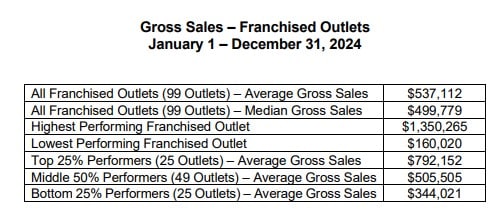Duck Donuts Franchise FDD, Profit & Costs (2025)

Duck Donuts, a renowned name in the donut industry, is celebrated for its unique concept of “Warm, Delicious & Made-to-Order” donuts. The franchise embarked on its journey in the scenic Outer Banks of North Carolina, with the first store opening its doors in Duck and Kitty Hawk.
This humble beginning soon transformed into a global sensation, leading to Duck Donuts becoming an award-winning brand recognized for its innovative approach to donut making. The franchise took a significant step in 2013 by opening its first franchise location in Williamsburg, VA.
Headquartered in Mechanicsburg, Pennsylvania, Duck Donuts sets itself apart with a business model that emphasizes simplicity, growth potential, and ease of operation within a compact store layout.
This model has been designed to cater to various operational scenarios, including traditional stores, non-traditional locations, food trucks, and even catering services, offering franchisees multiple avenues for revenue.
Initial Investment
How much does it cost to start a Duck Donuts franchise? It costs on average between $469,000 – $691,000 to start a Duck Donuts franchised restaurant.
This includes costs for construction, equipment, inventory, and initial operating expenses. The exact amount depends on various factors, including the type of restaurant you choose, the location, and whether the franchisee chooses to lease or purchase the property.
| Type of Expenditure | Amount |
|---|---|
| Initial Franchise Fee | $40,000 |
| Your Training Expenses | $0 to $2,500 |
| Premises Deposits | $2,500 to $4,500 |
| Professional Design | $12,000 to $18,500 |
| Leasehold Improvements | $260,000 to $395,000 |
| Signage | $7,800 to $13,500 |
| Furniture, Fixtures, Equipment | $110,000 to $137,000 |
| Computer Systems | $18,000 to $25,000 |
| Initial Inventory | $7,000 to $10,000 |
| Grand Opening Marketing | $12,500 to $15,000 |
| Professional Fees | $750 to $5,000 |
| Licenses and Permits | $100 to $2,000 |
| Expeditor Fee | $6,000 to $9,000 |
| Insurance | $3,000 to $5,000 |
| Operating Expenses / Additional Funds – 3 months | $35,000 to $55,000 |
| TOTAL (excluding tenant allowance) | $514,650 to $736,800 |
| TOTAL PROJECT COST | $468,567 to $690,717 |
Average Revenue (AUV)
How much revenue can you make with a Duck Donuts franchise? A Duck Donuts franchised restaurant makes on average $500,000 in revenue (AUV) per year.
Here is the extract from the Franchise Disclosure Document:

Download the Franchise Disclosure Document
Frequently Asked Questions
How many Duck Donuts locations are there?
As of the latest data, Duck Donuts operates 143 locations across the United States. This growing network has helped Duck Donuts establish a broad presence, offering franchisees a recognizable brand and opportunities to expand into new markets.
What is the total investment required to open a Duck Donuts franchise?
The total investment required to open a Duck Donuts franchise ranges from $469,000 to $691,000.
What are the ongoing fees for a Duck Donuts franchise?
Duck Donuts franchisees are required to pay an ongoing royalty fee of 5-6% on their gross sales. Additionally, there is a marketing fee that is 3-4% of gross sales.
This marketing fee is used to fund advertising and promotional activities to drive brand awareness and support franchise locations at both a national and local level.
Who owns Duck Donuts?
Duck Donuts is owned by NewSpring Franchise, which acquired a controlling interest in the company. The brand was founded by Russ DiGilio in 2007 in Duck, North Carolina, but has since grown and undergone ownership changes to support its expansion and franchising operations.
Disclaimer
Disclaimer: This content has been made for informational and educational purposes only. SharpSheets is an independent educational resource and is not affiliated with, endorsed by, or representing any franchisor mentioned on this website. Where noted, figures are taken from the franchisor’s Franchise Disclosure Document (FDD). In some cases, we may provide independent calculations or estimates based on publicly available information. We do not make any representation or warranties with respect to the accuracy, applicability, fitness, or completeness of the information presented in the article. You should not construe any such information or other material as legal, tax, investment, financial, or other professional advice. Nothing contained in this article constitutes a solicitation, recommendation, endorsement, advertisement, or offer to buy or sell any franchises, securities, or other financial instruments in this or in any other jurisdiction in which such solicitation or offer would be unlawful under the franchise and/or securities laws of such jurisdiction.
All content in this article is information of a general nature and does not address the detailed circumstances of any particular individual or entity. Nothing in the article constitutes professional and/or financial and/or legal advice, nor does any information in the article constitute a comprehensive or complete statement of the matters discussed or the law relating thereto. You alone assume the sole responsibility of evaluating the merits and risks associated with the use of any information or other content in this article before making any decisions based on such information or other content.




